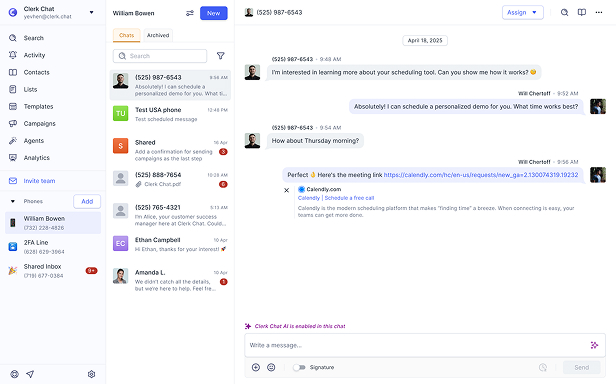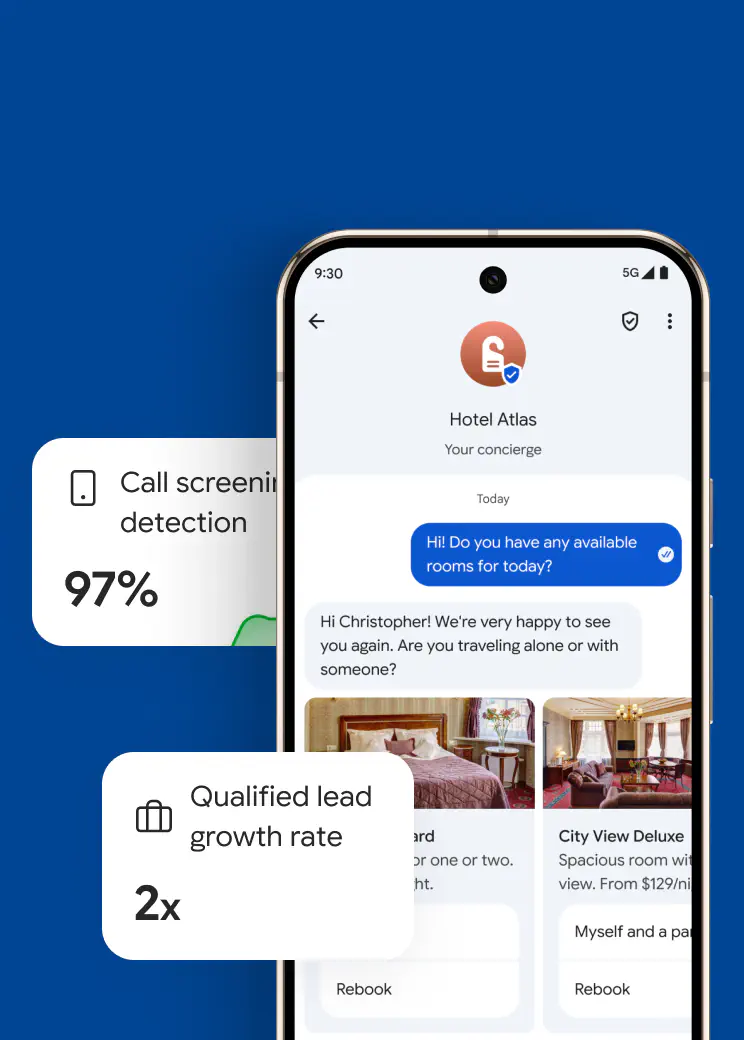Grow your Business with Conversational AI for Real Estate
By William Bowen
- Published: June 30, 2025
Key points in this article:
- Conversational AI is a revolutionary technology for the real estate industry. It allows companies to boost efficiency, improve customer experiences, and enhance sales.
- With conversational AI, real estate leaders can transform property discovery strategies, generate more substantial leads, increase revenue, and even host enhanced virtual tours.
- Conversational AI tools deliver benefits like 24/7 availability, enhanced customer service, and cost reductions, but organizations still need to overcome challenges.
- The key to a successful AI implementation is the right strategy. Focus on finding easy-to-use, compliant, and customizable platforms that support integrations with your existing technology.
- Smooth integrations, advanced algorithms, and even agentic AI workflows will further enhance conversational AI tools in the years ahead.
The Evolution of the Property Industry
The property industry is evolving. Developers, property managers, and real estate agents are rapidly embracing new technologies to improve customer experiences, sales, and efficiency. Like real estate text message marketing revolutionized how leaders connect with leads, conversational AI is now reshaping countless processes.
Conversational AI for real estate goes beyond giving companies access to cutting-edge chatbots that can answer questions about property listings 24/7. Transformational platforms are helping organizations identify the right leads, schedule comprehensive communication strategies, and unlock new growth. It’s easy to see why, according to Deloitte, around 72% of real estate leaders are now investing in AI.
This isn’t a passing fad that innovators can afford to gloss over. If you want to stay ahead in the growing property industry, this guide will teach you everything you need to know about the incredible impact of conversational AI.
In this article:
The Role of Conversational AI in the Real Estate Industry
So, what is conversational AI, and why does it matter to real estate pioneers?
Our comprehensive conversational AI vs chatbots guide will give you the full run-down if you’re a beginner. But, primarily, you need to know that conversational AI is the technology that allows machines to understand and respond to human language.
It’s the combination of Natural Language Processing (NLP), machine learning, and sometimes even generative AI algorithms that allow bots to hold natural conversations with customers. Systems powered by conversational AI don’t just respond to specific terms or “keywords” in a text - they can understand the emotion and intent behind sentences.
This makes them incredible for personalized sales, marketing, and customer service tasks. In real estate, conversational AI tools can engage buyers 24/7, providing instant access to relevant listings, answering questions, and scheduling property tours.
They can handle initial inquiries about properties and prices, qualify leads for sales teams, and even provide behind-the-scenes insights into crucial data. In simple terms, conversational AI for real estate allows businesses to deliver better customer experiences while reducing the funds and energy organizations need to invest in various processes.
24/7 responses that engage buyers
Conversational AI for Real Estate: Top Use Cases
Ultimately, artificial intelligence isn’t an entirely new concept. Forward-thinking companies have been exploring innovative “PropTech” solutions for years - from basic chatbots for customer service to more advanced AI tools for data analysis.
But conversational AI in real estate is becoming increasingly valuable, as companies struggle to capture, convert, and retain more discerning buyers.
On a broad scale, conversational AI enterprise solutions enable organizations to enhance every part of the customer journey - from improving access to relevant listings and information to navigating virtual tours.
Transforming Property Discovery
Remember just a few years ago, what it was like to try to buy a house? Finding a property perfect for your needs meant spending hours searching through listings.
Even when you found something suitable, you’d have to arrange an appointment with a professional manually. Conversational AI for real estate is changing all that. AI tools built into a website can instantly direct customers towards relevant listings based on their budget, background, location, and other factors.
Companies can even embed AI tools into their conversational marketing strategies, giving buyers bots that can ask questions about their priorities, and even notify customers when new properties appear that match their criteria.
Customers can ask questions about properties at any time of the day or night and schedule appointments to view a home whenever they like. The system simply needs to check an integrated calendar for an available date, and it can book a slot in seconds.
Generating and Qualifying Leads
It’s no secret that lead generation is crucial to survival in the real estate industry, but constantly collecting and qualifying leads is complex and time-consuming.
Conversational AI for real estate companies doesn’t just make it easier to generate new leads, it helps organizations qualify and nurture those leads too. An AI system can collect data from multiple sources, such as your business texting software, social media, and online behavior, to identify potential clients who might be ready to buy or sell.
These tools can score leads based on their level of intent, showing sales professionals who they should target with offers or advice. The same solutions can even help with nurturing qualified leads. For instance, after a customer reaches out to a company, showing interest in a house, or asking about listing a property, an AI lead follow-up tool can ensure teams keep the conversation going, reducing the risk of lost opportunities.
Enhancing Sales and Marketing with Personalization
Consumers want personalized experiences from every type of company these days, but personalization is particularly crucial in the real estate industry.
No one wants to be bombarded by messages from an automated texting service encouraging them to sell their property after they’ve just bought it, or when the market is in a downturn. Similarly, your customers don’t want to receive information about listings outside their price range or irrelevant to their location.
Conversational AI in real estate marketing and sales strategies helps you target customers with relevant messages.
The right tools can help you segment customers into different groups based on their needs so that you can develop more impactful conversational messaging, marketing, or sales strategies. They can even constantly gather customer data, updating profiles in real time as soon as a customer shows interest in a particular product or service.
Some AI tools can even dynamically update the content on your website based on a customer’s location or previous searches, improving the overall search experience.
Optimizing Virtual Tours
We’ve already mentioned some fantastic ways conversational AI tools can improve the initial stages of the customer journey, such as helping customers find relevant properties or schedule appointments with experts.
However, these tools can also help with the later stages of the buyer journey. Advanced bots can assist potential clients in exploring listings with three-dimensional videos and detailed information, wherever they are in the world.
This allows companies to embrace the next level of personalization in customer service, allowing buyers to view and explore properties whenever and however they choose.
That kind of experience doesn’t just improve customer satisfaction rates - it also saves actual real estate professionals a lot of time and money. Imagine how much your company could save without constantly sending agents to show buyers around various properties?
Unlocking Business Insights
Another great thing about conversational AI for real estate is that it can allow companies to draw more insights from data. Imagine collecting insights from your communication tools, such as your RCS business messaging app, contact center, and call logs, and CRM systems, to learn more about customer preferences or pain points.
Or, how about using historical data to uncover new opportunities? For instance, by analyzing demographic shifts, neighborhood or community developments, and economic conditions, AI could help you predict which areas will experience an increase in property value.
Data gathered by conversational AI tools for customer service can even help property managers and real estate companies offer more proactive services.
For instance, if your system notices that buyers from a particular area are likely to flag issues with plumbing or wiring after a specific period in a new house, you could set up an automated AI-powered texting service to send customers scheduled messages that show them how to troubleshoot issues or request maintenance support.
24/7 responses that engage buyers
The Benefits of Conversational AI for Real Estate
The benefits of conversational AI in real estate will only continue to grow as new technologies evolve. Already, the latest AI tools are providing access to competitive advantages such as:
24/7 Availability
Real estate consumers are busy. They don’t always have the time to review property listings and call agents during standard operating hours. Conversational AI in customer service allows real estate firms to address customer concerns 24/7.
Conversational bots can answer questions 24/7 and keep customers engaged throughout the purchasing process. They can regularly update them on new property listings, offers, and share incentives that might prompt them to book a meeting or consultation.
Just remember, if you’re using conversational AI for marketing messages (as well as responding to customer queries), you will need to make sure you’re adhering to the rules about when you can send messages, such as those set by the Telephone Consumer Protection Act, which restrict promotional messaging hours.
Enhanced Customer Service
As mentioned above, conversational AI for real estate directly impacts customer satisfaction rates. It personalizes customers’ experiences in real time, helping them find listings relevant to their interests or learn more about selling opportunities.
It can also improve booking and scheduling experiences. Some conversational SMS texting solutions can send automatic reminder messages to customers about upcoming open houses or appointments and answer any questions they might have.
Plus, conversational tools can improve virtual viewings and property tours, assist customers in filtering through property options, and give them valuable tips, such as guiding them towards the proper insurance or legal services when buying a new home.


Improved Efficiency and Cost Reductions
Whether you’re investing in conversational AI in insurance, financial services, healthcare, or real estate, one of the biggest benefits of this technology is that it saves companies time and money.
Since conversational AI tools can automate your business messaging strategies, and answer common customer questions 24/7, they free up agents and professionals to focus on more valuable tasks, like negotiating deals or building client relationships.
These automations can help you avoid lost revenue by ensuring you always follow up with leads at the right time and keep them engaged. AI tools can also automate tasks like summarizing conversations or updating customer profiles.
On top of that, conversational AI for real estate can make entire teams more productive and effective. For instance, bots can provide step-by-step guidance and support to agents dealing with customer queries, or sales professionals pitching services to buyers.
Some solutions can even offer coaching assistance to marketing teams or help them craft more personalized text messages, with instant insights into customer segments.
The Challenges of Conversational AI in Real Estate
The benefits of conversational AI for real estate companies are huge, but there are still challenges to address. For instance, integrating AI tools into existing solutions can be complex, particularly if you rely on a wide range of tools, such as text message archive software, booking and calendaring systems, and collaboration tools.
Customizing these bots and ensuring they adhere to your brand and compliance guidelines can also be challenging without technical knowledge.
The most significant overall problem is leveraging AI without exposing your company to compliance, security, and data privacy risks. Most real estate transactions involve sensitive information, and an insecure bot could easily leak data to criminals.
Plus, if you want to personalize your marketing strategies, you’ll need to feed your tools a lot of sensitive data, which could expose you to issues with compliance guidelines. There’s even the risk that specific automation strategies could put you at odds with marketing compliance guidelines, such as those outlined in our SMS compliance 2025 guide.
You could face severe fines if your bots contact the wrong customers (people who haven’t given you their explicit consent) or send messages at inappropriate times.
Top Tips for a Successful AI Implementation
Ultimately, the key to accessing the benefits of conversational AI in real estate (while side-stepping the challenges), is the right strategy. We recommend the following tips to anyone embracing the future of AI tools:
- Consider Ease of Use: The easier a conversational AI platform is to use, customize, and monitor, the more it will benefit your team. Look for a solution that’s intuitive, user-friendly, and backed by an excellent support team.
- Prioritize Integrations: Look for flexible solutions to integrate with your existing systems. For instance, Clerk Chat’s conversational AI solution offers a Salesforce SMS integration and support for various archiving tools, CRM platforms, and collaboration apps.
- Remember Compliance: Educate yourself on compliance standards. Ensure you adhere to the rules regarding promoting your properties and services to customers, and constantly acquire consent before messaging contacts.
- Experiment: Explore various ways of using conversational AI for real estate processes. For instance, once you’ve explored a range of SMS examples for real estate marketing, you might also use AI to enhance your sales strategies and customer service processes.
- Monitor and Optimize: Track the performance of your conversational AI tools. Monitor metrics like opt-in and opt-out rates, click-through and conversion rates, and overall engagement. Gather feedback from customers so you can fine-tune your strategy over time.
Conversational AI for Real Estate: Trends to Watch
If you think conversational AI is impressive now, just wait. New trends in this landscape are constantly emerging, introducing new opportunities for growing organizations.
For instance, artificial intelligence algorithms are becoming more sophisticated, with large language models and deep learning solutions that empower systems to better understand user emotions, intent, and preferences. These systems also improve at gathering and analyzing large volumes of data, leading to deeper insights for teams.
AI systems are also becoming more flexible and accessible, with convenient low-code and no-code platforms, and pre-built customizable bots. Many solutions can seamlessly integrate with various property management apps, CRM platforms, and communication channels, making them more valuable to business leaders.
We’re also seeing the rise of agentic AI, which takes the automation capabilities of conversational AI solutions to the next level. Agentic systems can combine multiple bots to complete various tasks. For instance, an agentic AI workflow could qualify valuable prospects for a real estate team, send initial marketing messages to those prospects, answer questions, and book appointments, all without human prompting.
Whether you’re interested in conversational AI in financial services, insurance, property management, or real estate, diving in now is the best way to stay ahead of these emerging opportunities and your competition.
Finding a Home in the Conversational AI Era
AI might not be an emerging trend in the real estate industry today, but business leaders face increasing pressure to adopt cutting-edge technologies or risk falling behind.
Exploring the benefits of conversational AI for real estate is an excellent way for property leaders to enhance customer experiences, increase sales, streamline tasks, and even cut costs as the market grows more competitive.
The good news? You don’t need to hire a team of professional developers or tech experts to dive into the world of conversational AI. Clerk Chat, the world’s leading conversational messaging platform, makes sales, marketing, and customer service easy with customizable, integration-ready AI tools.
With our platform, you can enable an intuitive AI agent, ready to connect with buyers and sellers across multiple channels, increasing your sales and customer loyalty rates.
Don’t fall behind in the evolving real estate market. Discover the easy way to unlock the benefits of conversational AI, with Clerk Chat.
Will’s latest superpower is building innovative AI solutions to add value for clients. He's passionate about all things AI, entrepreneurship, and enjoys staying active with sports and outdoor activities.
In this article:
- The Evolution of the Property Industry
- The Role of Conversational AI in the Real Estate Industry
- Conversational AI for Real Estate: Top Use Cases
- The Benefits of Conversational AI for Real Estate
- The Challenges of Conversational AI in Real Estate
- Top Tips for a Successful AI Implementation
- Conversational AI for Real Estate: Trends to Watch
- Finding a Home in the Conversational AI Era
Ready to use your business number for text messaging?
Thousands of businesses are already experiencing the power of conversational messaging through SMS. Join us. Free trial and paid tiers available.
Get Started#Subscribe
Get product updates in your inbox
Tutorials, features, and Clerk Chat news delivered straight to you.



